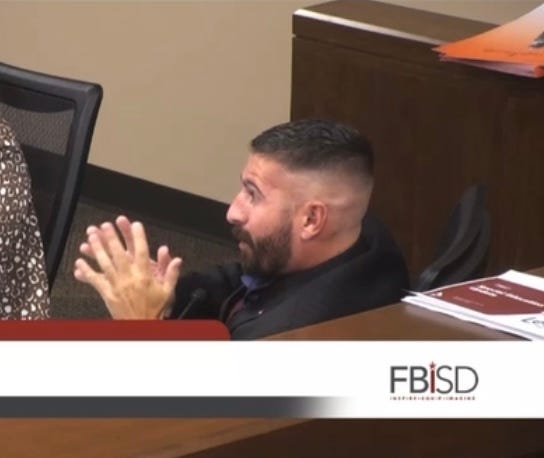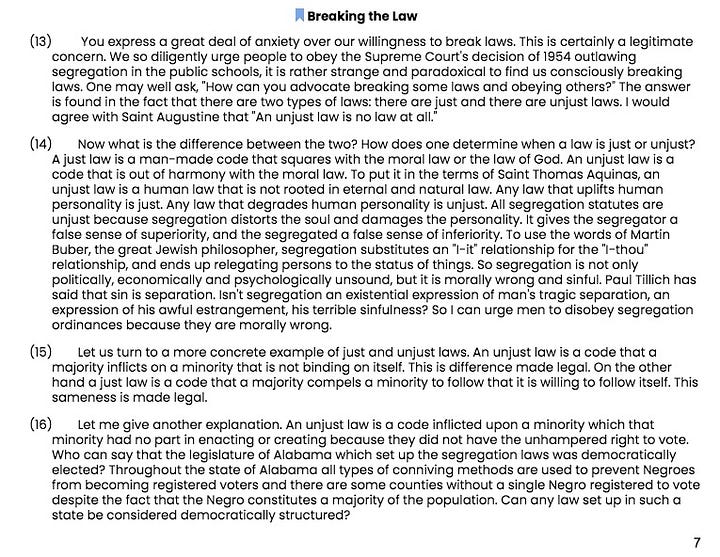“This is not a shock to anybody. Come on.”
Instead of listening to their constituents, Fort Bend ISD trustees lecture them. PLUS: What is Llano doing right? Katy, Conroe, and the rest of this month's School Board Roundup.


Fort Bend ISD Enacts Restrictive Book Policies Over Community Opposition
Q: What do Kristin Tassin, David Hamilton, Sonya Jones, and Adam Schoof have in common?
A: None won a majority of the votes for their seat on the FBISD school board, and none of the four thought it was important to listen to community input on the district’s new book policy.
The four were joined earlier this month by fellow trustee Rick Garcia to vote in favor of one of the most restrictive policies in Texas over outcry from local parents, students, teachers and librarians.
The new EFA Local (Instructional Materials) and EFB Local (Library Resources) policies dissolve the district’s book review committees, vest authority for evaluating challenged books in the hands of the superintendent (who answers to the board) and exclude from the district any books that “advocate or promote” unlawful activities, sexual activity among minors, or racial, ethnic, sex-based, or religious stereotypes.1 This language goes well beyond the requirements of Texas law or the state standards, and puts Fort Bend on par with Keller ISD and Katy ISD, whose restrictive book policies have brought those districts legal battles, controversy, and national ridicule.
In fact, the policy is so restrictive it seems to ban Martin Luther King Jr.’s “Letter from Birmingham Jail,” which, in its defense of civil disobedience and direct action, inarguably “advocates or promotes unlawful activity.”
More than a dozen commenters spoke against the policies during public comment. No one spoke in favor of the policies—in fact, some commenters who had signed up to speak on separate topics expressed opposition to proposals.
Board members responded with defensiveness and anger. Trustee Sonya Jones, who won 39% of the vote in her 2023 election, said the policy would remove “degenerate books” that might lead Fort Bend students to become “degenerate adults.” Adam Schoof, who garnered 35% of the vote in his 2024 race, leaned back in his chair and said that though he had received “nonstop emails” about the policy, he wasn’t going to “play ball” with members of the public who opposed the policy because he found certain books in high school libraries “pornographic” and critics of the policy hadn’t acknowledged that.2 Board president Kristin Tassin said, “Someone said they trust the librarians more than the trustees. That’s fine, but this is our job. This is what we were elected to do,” she said. “Ultimately, we are going to be the decision makers.”
Tassin won her spot on the board with 32% of the vote.
When the final votes were tallied, some community members in the crowd booed. Tassin let them know once more that the community’s emails, public comments, and entreaties hadn’t moved the board majority. “This is not a shock to anybody,” she said. “Come on.”
Two trustees, Shirley Rose-Gilliam and Angie Hanan, opposed the policy. Hanan, a member of district’s policy committee, claimed that she had been improperly cut off from the drafting of the policies, and then laid out a number of concerns with the policy, echoing many of the night’s community speakers. “This is going be a hot mess,” Hanan said.3
Both Hanan and Rose-Gilliam won their most recent elections with more than 50% of the vote.
Llano ISD Continues to Resist Censorship
Fort Bend County has voted Democrat for the past two presidential elections; Llano County, in the deep red heart of the Texas Hill Country, is about as Republican as a place can get. In the 2020 election, 80% of Llano County voters voted for Donald Trump.
Yet at the same time Fort Bend ISD was approving its extreme anti-book book policy, trustees in Llano ISD were unanimously rejecting a Level-3 challenge to Crank by Ellen Hopkins. The challenge was made by Bonnie Wallace, a member of the Republican Party’s “Stop Sexualizing Texas Kids” priority during the 2023 legislative session and one of the handful of people most responsible for driving anti-book hysteria in the state.4
Superintendent Mac Edwards explained to Wallace that the book does not violate the law or district policy, and that the decision was reached by a committee involving parents and school administrators.
Wallace has formally challenged 21 books in the district, but this will be one of her last, since Llano ISD also recently adopted a new book policy limiting book challenges to district employees, parents and guardians. Wallace currently has no children in the district.
The board’s decision raises a question: Why have Democratic-leaning or purple suburban districts raced to remove books and adopt restrictive policies, while some rural, conservative districts like Llano ISD have held the line against censorship?5
One obvious answer is that book-banning is not a partisan issue. Although currently most book ban policies are driven from the extremes of the Republican party, in researching for my Book-Loving Texan’s Guides to Texas School Board Elections, I’ve consistently found that some of the most stalwart defenders the right to read and the free exchange of ideas are Republicans. That will be true this November, as well.
But I think there’s something more at play, too. Fomenting anti-book hysteria requires demonizing teachers and librarians, and that hits differently in a community where those teachers and librarians are neighbors and friends.6
I’m thinking of the teacher in Fort Bend meeting who pleaded with trustees not to adopt the new policies, saying, “I am not a groomer.” She was speaking directly to a board where at least one member has repeatedly used that language to refer to his opponents, and shared videos from political operatives calling district librarians “woke and wicked leftist librarians who infiltrate school systems” and where another trustee goes on rants about books creating “degenerate adults.”
That teacher had recently transferred into the district from Houston ISD, and many suburban teachers commute into the districts where they work from neighboring areas. Many are not eligible to vote in the districts that employ them. I’ve spoken to a number of educators from Fort Bend and districts like it who have told me they don’t think trustees feel any need to listen to them or take their expertise into account when making decisions that affect how they do their job.
Of course, watching Fort Bend’s August meeting—in which not just educators, but parents, students, and all manner of community members clearly rejected the board’s vision—it was clear that particular group of trustees doesn’t feel like it’s accountable to anybody.
Katy ISD Adopts Unconstitutional “Gender Fluidity” Book Ban
Another of the state’s cautionary tales is Katy ISD, where an extremist board majority has enacted harsh restrictions on library materials and throttled library purchases. The same night Llano was telling book banners to stuff it and Fort Bend was enacting its new policies, Katy ISD adopted an amendment to its book policies that forbids books “adopting, supporting, or promoting gender fluidity.”
The change is unconstitutional—while there is room to argue about what makes a text “educationally unsuitable” or what constitutes “pervasively vulgar,” school districts cannot remove books because they object to the ideas those books contain.
Community members spoke up movingly against the policy—to no avail. The district is already under federal investigation for a gender policy it enacted earlier this year; this action ensures its legal troubles will continue.
Conroe ISD Reconsiders its Book Policies
As I mentioned in a couple of recent posts, Conroe ISD has been facing the consequences of a book-removal frenzy pushed by a handful of vocal extremists. The majority of the board is not thrilled with those consequences. Specifically, trustees have expressed concern about AP English students not having access to books that can help them succeed on their end of year exam, about teachers not being able to teach well-regarded works of literature, and about general overreach in removing books that benefit students. “Nobody wants porn in the library,” said Board President Skeeter Hubert. “But I believe that there is difference between porn, which is arousal and titillating and all of that stuff, and discussing sensitive issues, like in The Color Purple when you’re talking about rape and incest. That is not pornography.”
So in August the district began the process of reconsidering its book policies. Trustee Stacey Chase promised to return to the board with specific revisions to address that overreach. Conroe ISD’s next meeting is Tuesday, September 17.
November Board Election Candidates Finalized
The fate of those potential revisions will likely depend on the outcome of November’s school board election in Conroe ISD, in which four seats, including Chase’s, are on the ballot. Conroe ISD will be among the highest-profile board elections in the state.
Candidate filings for the November election closed on August 19. I’ll soon publish my sixth Book-Loving Texan’s Guide to Texas school board elections, which will feature write-ups of the races in Conroe ISD, as well as consequential elections in Leander, Round Rock, and more. Check back!
As community group Friends of FBISD Libraries pointed out before the meeting, the policies do not define what it means to “advocate” or “promote” an activity—thorny (and often subjective) questions for complex works of literature. What’s more, the policies don’t require that the texts of books be read in their entirety to help answer those questions.
Schoof didn’t explain why the presence of those books requires implementing a new hyper-restrictive policy. The specific book he mentioned, a sex-ed reference text titled The Little Black Book for Girlz: a Book on Healthy Sexuality, has never been challenged in the district. Schoof himself never challenged any books in Fort Bend ISD under its previous policy.
Hanan referenced a previous controversy over an the district’s EIC policy, which determines high school class rank. “Parents came then and said, ‘This is going to be a hot mess,’” Hanan said. “And nobody listened. And voila! Here we are in the middle of EIC hot mess, too.”
Wallace, who was installed as a member of the Llano County Library Advisory Board after sending the Llano Public Library a list of 60 books she wanted removed, is currently a defendant in Little v. Llano County, which is working its way through the 5th Circuit Court of Appeals. She has also appeared at board meetings in districts around the state alongside the “Traveling Pastor Circus,” a group of religious leaders who have been demanding the removal of all books from a 676-title list they’ve been emailing to trustees and administrators around Texas.
Two candidates backed by Wallace who supported removing large numbers of books from schools were also defeated handily in Llano ISD’s May trustee elections.
Not that Llano is immune to ugly, un-neighborly behavior over books! But two of the district’s trustees are married to district librarians, and arguments that librarians are filthy, Marxist groomers just aren’t going to land the same in that situation.




Ugh. I'm taken aback by that quote about "woke and wicked leftist librarians." Given how many public school teachers and librarians are women, it's hard not to think about book banning as a form of modern-day witch trials.